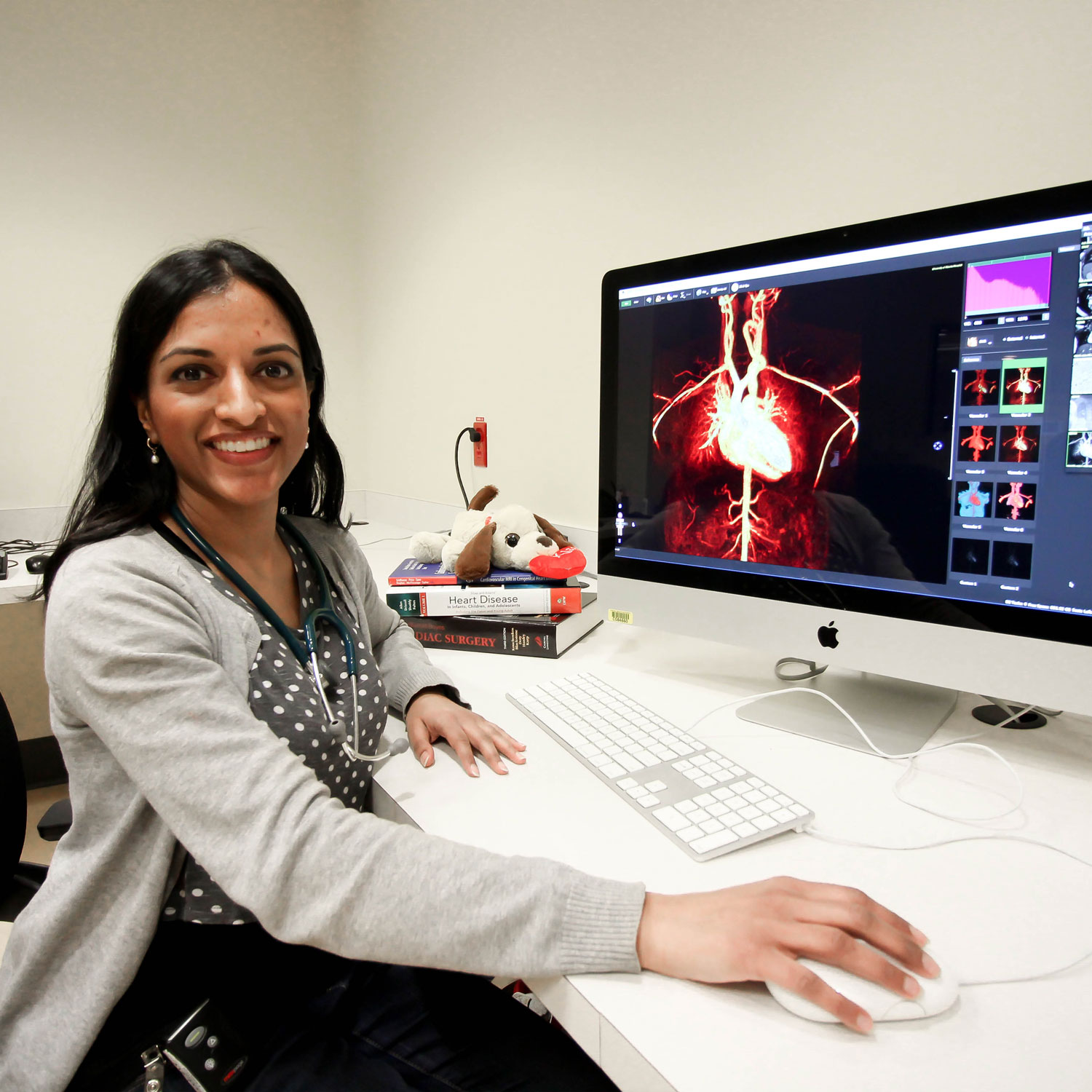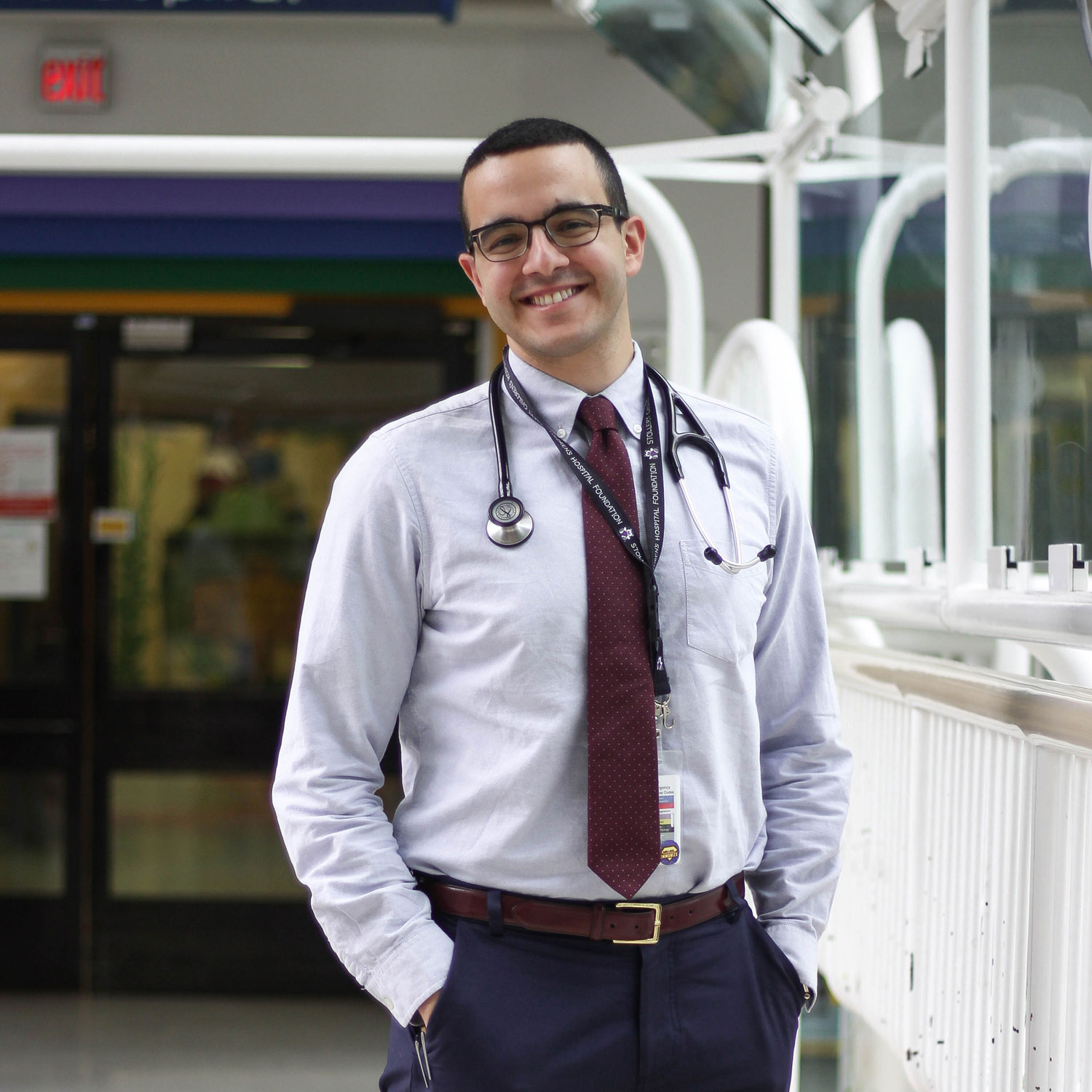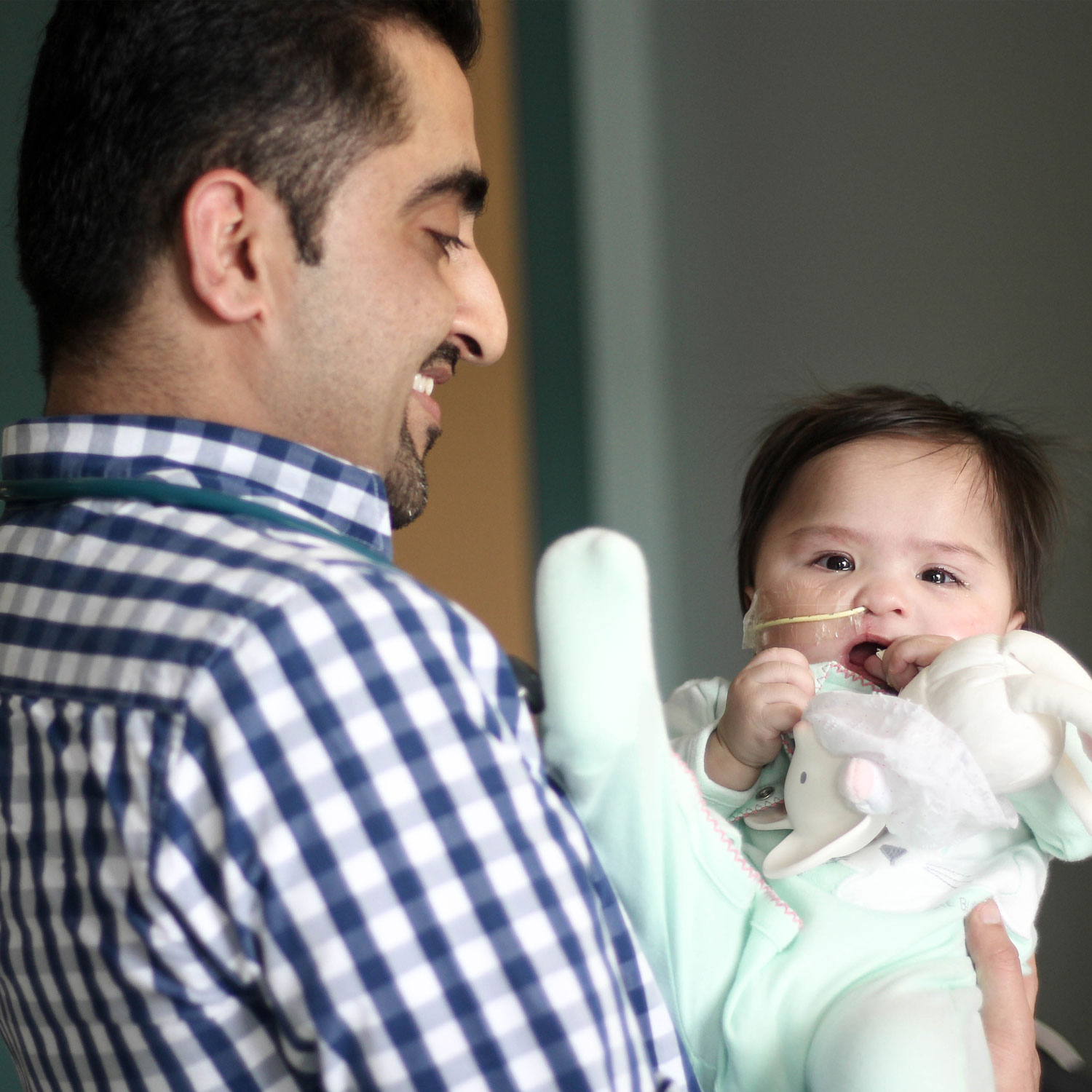Pediatric Cardiology Residency Program
Welcome to the Pediatric Cardiology Residency Program at the University of Alberta.
EXPERTISE
17 full-time staff cardiologists with expertise in all cardiology subspecialties
EXPERIENCE
Our program has a busy surgical team, with 3 pediatric cardiac surgeons who perform the majority of the cardiac operations among children and adults with congenital heart disease in Western Canada
VOLUME
More than 700 cardiac surgeries, 10,000 echocardiograms, and 350 cardiac catheterizations are performed annually
Interview/CaRMS Specific Information
Interviews for the Pediatric Cardiology Residency Program are conducted virtually (via Zoom) in the spring. You will be interviewed by the Program Director, Associate Program Director and the Lead Residents. The rest of the interviewers will represent staff who are both members and non-members of the RPC.
We are looking for bright, highly motivated residents who are interested in building an academic career in pediatric cardiology. Those candidates with a strong academic interest and excellent communication skills are highly rated as it is these individuals who will help to advance the frontiers of pediatric cardiology. Specific characteristics sought are those with initiative, leadership skills, humility and a team player. Residents must be willing to work hard and provide constructive feedback into building and improving our program. We are looking for residents who will best fit our program goals and objectives.
We understand how busy and stressful the interview process can be. Between morning and afternoon interviews you will have the opportunity to connect virtually with the current program residents online to ask any questions about our program.
Applicants will be contacted via email by the Medical Education Program Coordinator.
Please see carms.ca for additional information.
We will take you on a virtual tour of our hospital. Our Division typically hosts a virtual social gathering during the evening so you can get to know our other Faculty and residents.
We welcome international applicants outside of CaRMS and require language proficiency verification. The number of international applicants we can take will depend on the results of CaRMS.
Review the PGME website: https://www.ualberta.ca/medicine/programs/postgraduate-medical-education/applicants/sponsored-international-trainees-at/index.html
Residency applications must include:
- Letter of Financial Support
- Curriculum Vitae
-
- Research experience
- Other scholarly work
- Extracurricular activities
- Leadership roles
4. Three (3) Letters of Recommendation
5. Copy of Medical Degree
6. Full Medical School Transcripts including pediatric rotation evaluations and cardiology electives
7. Pass standing results for the Medical Council of Canada Qualifying Examination (MCCQE) Part 1.
8. Successful results of one of the CPSA accepted English Language Proficiency tests
*Please note programs may request additional information.
For more information about the required language proficiency verification click here.
Contact Us
Department of Pediatrics
Edmonton Clinic Health Academy
Room 3-578, 11405-87 Avenue
Edmonton, Alberta, T6G 1C9
Dr. Edythe Tham
Program Director
etham@ualberta.ca
Dr. Carolina Escudero
Associate Program Director
escudero@ualberta.ca
Heather McCallum
Medical Education Program Coordinator
pedscard@ualberta.ca

Dr. Edythe Tham
Program Director

Dr. Carolina Escudero
Assistant Program Director
Welcome to Our Program
Welcome to Pediatric Cardiology at the Stollery Children's Hospital, University of Alberta. We have an active and busy clinical program with expertise in all subspecialties of pediatric cardiology and pediatric cardiovascular surgery. Our faculty includes 17 pediatric cardiologists who collectively have a wealth of training and knowledge in clinical practice and research including basic science, translational and patient outcomes.
Our program has a busy surgical team, with three pediatric cardiac surgeons who perform the majority of cardiac operations among children and adults with congenital heart disease in Western Canada. This high volume of patients provides our trainees with many opportunities to gain experience within all areas of pediatric cardiology, from clinical evaluation to diagnostic imaging and patient management.
A weekly academic half day, morning case-based and other weekly educational events serve to provide a very comprehensive knowledge base for our residents. Trainees are continually challenged through a series of in-training exams to ensure that they are well prepared for their Pediatric Cardiology Royal College examinations. With the launch of CBD in July 2020, we are more than ready and well-prepared to ensure you meet the goals of this new training system.
Our Program
Our Pediatric Cardiology Residency is a 3-year training program.

Program Highlights

17 full-time staff cardiologists with expertise in all cardiology subspecialties including invasive electrophysiology, interventional catheterization, heart failure, transplant cardiology, pulmonary hypertension, and cardiac imaging including echocardiography (3-dimensional echo, fetal imaging) and cardiac MRI


The program is the major surgical referral center for the Western Canadian Children’s Heart Network, with 3 pediatric cardiovascular surgeons performing more than 700 operations/year

The Stollery Ventricular Assist Device Program and Cardiac Thrombosis Program (KidCLOT) are recognized on the international stage


Research opportunities: the Scholarly Oversight Committee is available to assist the resident in the completion of a scholarly research activity
Residency at a Glance
With the launch of Competency Based Medical Education (CBME) on July 1, 2020, the Pediatric Cardiology training is competency based. We adopt the previous guidelines from the Royal College for the number of rotations as outlined here, with the flexibility to modify the schedule based on the achievement of required competencies.
Residents will perform all the required Entrustable Professional Activities (EPAs) in order to achieve the milestones for their stage of training. This will occur in the form of coaching and feedback via direct and indirect observation of clinical, teaching and research performance, as well as Objective Structured Clinical Examinations (OSCEs) every 6 months, witnessed history and physicals, and a written exam. The Competency Committee will review the residents' portfolio and make decisions and recommendations to the Residency Program Committee (RPC) for progression to the next stage of training. The training experiences will be tailored ensure that each individual resident will achieve all the required competencies to practice independently as a Pediatric Cardiologist in accordance with the Objectives of Training and Specialty Requirements of the Royal College of Physicians and Surgeons of Canada and be eligible for the Certificate of Competence in Cardiology.
- High volume of patients provides our trainees with many opportunities to gain experience within all areas of pediatric cardiology, from clinical evaluation to diagnostic imaging and patient management
- Weekly academic half day, morning case-based and other weekly educational events serve to provide a very comprehensive knowledge base for our residents
- Trainees are continually challenged through a series of in-training exams to ensure that they are well prepared for their Pediatric Cardiology Royal College examinations
- Further fellowship training in Pediatric Cardiology is available in all subspecialty disciplines and undergoes a competitive funding process.
- Various sources of funding to support educational endeavors and research support are available through Post-graduate Medical Education (PGME), Department of Pediatrics, Women and Children's Health Research Institution (WCHRI) and the Department of Pediatric Cardiology Special Education Purpose Fund.

Abbreviations:
- TTD - transition to discipline, FD - foundations of discipline, CD - core of discipline, TTP - transition to practice
- Adult – Adult Congenital; Cath – Catheterization Laboratory; Consult; Echo – Echocardiography; Elect – Elective (2 internal, 3 external); EP – Electrophysiology; Image – Cardiac MRI, Hrt fx - Heart function/transplant, Path – Pathology; PCICU – Pediatric Cardiac Intensive Care Unit; Rsrch – Research; VA- Vacation; Ward – Clinical Training Unit (Inpatient Service). Vacation does not need to be taken in one month blocks; 1-2 week blocks are also acceptable.
TEACHING HOSPITALS
We are a fully accredited program that follows the guidelines set out by the Royal College of Physicians and Surgeons of Canada.
This is the Women's hospital and is situated a short distance north of the Stollery Children's Hospital. It is accessible by a 10 minute train ride. Fetal echocardiography is performed here. It also performs high risk deliveries and thus contains a large neonatal unit where neonates with significant congenital heart disease are stabilized and then transferred to the Stollery Children's Hospital for further care.
This is the principal site of residency training and where the resident will spend the bulk of their time. Rotations held here include: inpatient ward service, echocardiography, consults to the general Pediatric service and emergency room, outpatient clinics.
Mazankowski Alberta Heart Institute (MAHI)
This is connected directly to the Stollery Children's Hospital and the University of Alberta Hospital. The MAHI houses the Cardiac surgery operating rooms, cardiac catheterization and electrophysiology laboratories, the Cardiac MRI unit, the Cardiac ICU, and the Shaw conference room where our Cardiosurgical conferences are held.
This where the resident will spend an external rotation for 1 block during their pathology rotation, supervised by their Cardiologists. Pathology courses are also held here during the year. This is a 3 hour drive South of Edmonton. Accommodations are provided to the resident during this rotation.
PROGRAM SUPPORTS
The goal of the Pediatric Cardiology Residency Training Program is to train residents in clinical competence in the broad field of Pediatric Cardiology with a sound understanding of the principles of cardiovascular diseases as they affect congenital and acquired disease in the fetus, newborn, child and young adult. The resident will acquire the core knowledge required as a basis for clinical competence as set out by the Royal College of Physicians and Surgeons of Canada. The resident will acquire technical and interpretive skills in echocardiography, electrophysiology, and pericardiocentesis, and interpretive skills in cardiac catheterization and cardiac MRI, as well as experience in managing patients in the intensive care setting.
Resident Testimonials
We asked our residents their highlights of the program, and one piece of advice for applicants about the interview process. Here is what a few of them had to say:

What are the highlights of the program for you? Very welcoming and friendly work environment, everyone has really taken the time to get to know me. The training is great with a lot of teaching and tons of volume, acuity and case variety.
What is one piece of advice that you want to share with applicants about the interview process? Be yourself, ask questions, take it all in and just find the program that is the best fit for you in terms of your personality and learning style!

What are the highlights of the program for you? The teaching here is outstanding. It really amazes me how invested all the cardiologists are in the trainees. Each patient is a teaching opportunity, with frequent bedside teaching sessions, imaging sessions in clinic, and ECG review any time one appears! In clinics, the cardiologists will frequently supervise your interactions and counselling with the patients and families and provide immediate feedback. I really have been amazed at the total commitment to teaching in this program.
What is one piece of advice that you want to share with applicants about the interview process? Ask lots of questions. Remember, not only are you being interviewed, but this is your opportunity to interview the programs as well! Prior to the interviews make a list of important features you feel a program should have. This will help guide your questions during the interview.

What are the highlights of the program for you? Friendly environment and supportive program director. Excellent imaging training which is a must no matter what subspecialty you take in pediatric cardiology. Well organized and educational cardiovascular conference.
What is one piece of advice that you want to share with applicants about the interview process? Just be yourself and spend time with trainees!